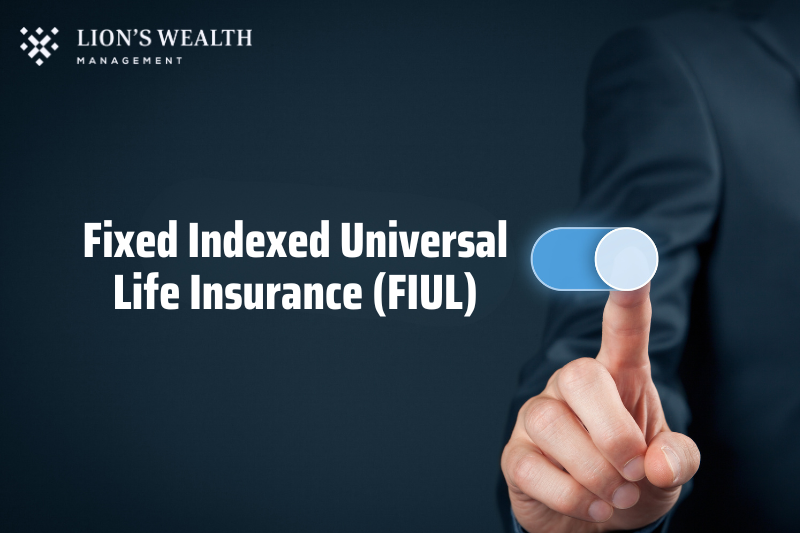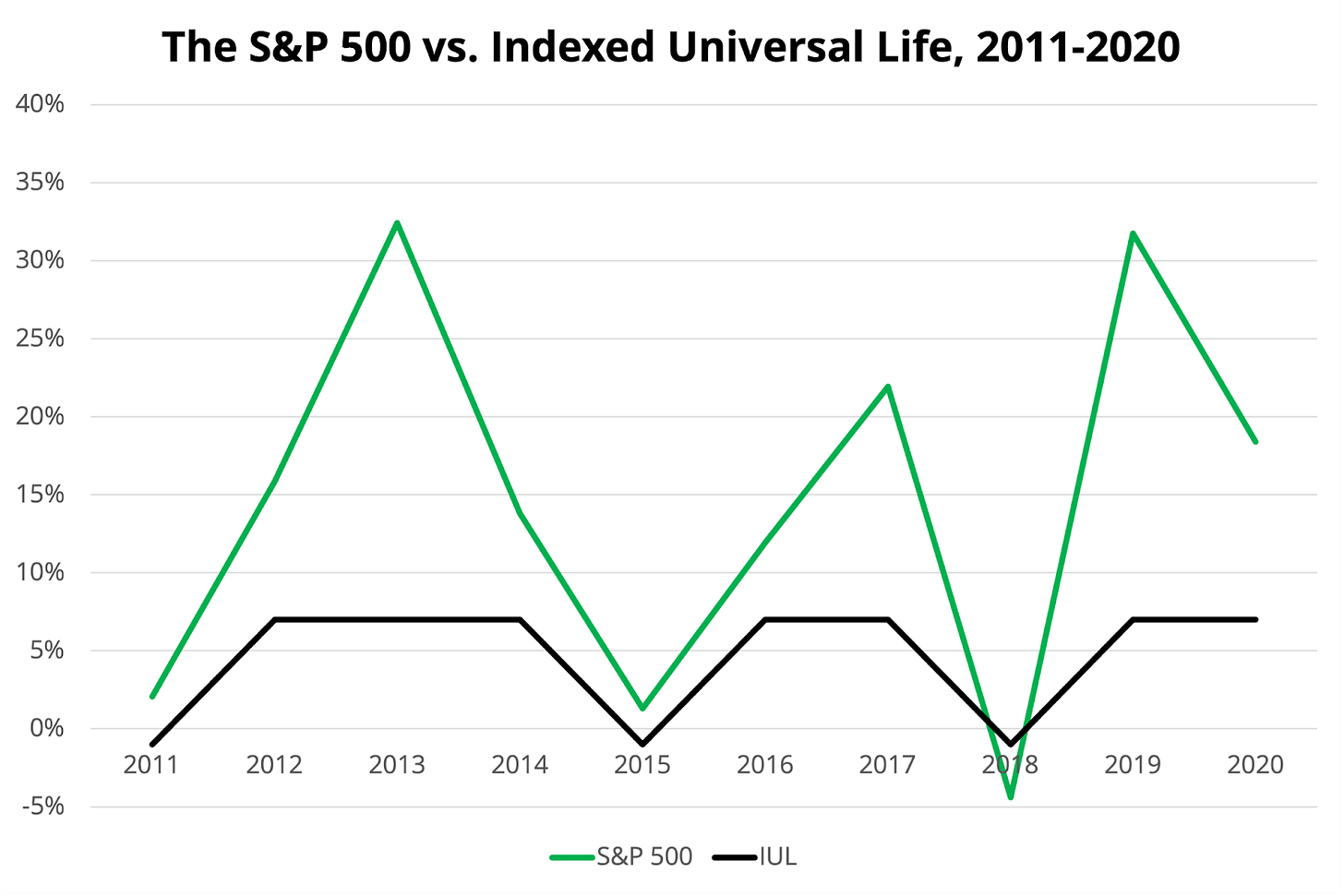All Categories
Featured
Table of Contents
Do they compare the IUL to something like the Vanguard Total Amount Stock Market Fund Admiral Shares with no tons, a cost ratio (ER) of 5 basis points, a turn over ratio of 4.3%, and a remarkable tax-efficient record of circulations? No, they contrast it to some dreadful proactively taken care of fund with an 8% tons, a 2% EMERGENCY ROOM, an 80% turn over ratio, and a terrible document of short-term funding gain circulations.
Common funds frequently make annual taxed distributions to fund owners, even when the value of their fund has actually gone down in value. Shared funds not just require earnings reporting (and the resulting annual taxes) when the shared fund is increasing in value, but can additionally impose income taxes in a year when the fund has actually dropped in value.
You can tax-manage the fund, collecting losses and gains in order to decrease taxed distributions to the investors, yet that isn't somehow going to change the reported return of the fund. The possession of shared funds may call for the common fund proprietor to pay projected tax obligations (universal life insurance cost calculator).

IULs are easy to position so that, at the proprietor's fatality, the beneficiary is not subject to either revenue or inheritance tax. The same tax obligation decrease methods do not function almost too with shared funds. There are many, commonly costly, tax traps connected with the timed trading of mutual fund shares, catches that do not relate to indexed life Insurance coverage.
Opportunities aren't extremely high that you're mosting likely to go through the AMT as a result of your common fund circulations if you aren't without them. The rest of this one is half-truths at best. While it is true that there is no revenue tax due to your beneficiaries when they acquire the earnings of your IUL plan, it is likewise true that there is no income tax due to your successors when they inherit a mutual fund in a taxable account from you.
Universal Life Insurance Cons
The federal estate tax obligation exception limitation mores than $10 Million for a pair, and growing every year with rising cost of living. It's a non-issue for the large bulk of doctors, a lot less the rest of America. There are much better means to avoid inheritance tax issues than buying investments with low returns. Mutual funds may cause earnings taxes of Social Safety and security advantages.

The growth within the IUL is tax-deferred and may be taken as free of tax earnings through fundings. The policy owner (vs. the common fund supervisor) is in control of his/her reportable revenue, therefore enabling them to decrease and even get rid of the tax of their Social Protection advantages. This set is excellent.
Here's an additional minimal concern. It holds true if you acquire a shared fund for state $10 per share simply before the circulation date, and it disperses a $0.50 circulation, you are after that mosting likely to owe tax obligations (most likely 7-10 cents per share) despite the truth that you haven't yet had any kind of gains.
In the end, it's really regarding the after-tax return, not how much you pay in tax obligations. You're additionally most likely going to have more money after paying those tax obligations. The record-keeping requirements for owning common funds are dramatically much more intricate.
With an IUL, one's records are maintained by the insurance provider, copies of yearly statements are mailed to the proprietor, and distributions (if any kind of) are completed and reported at year end. This is additionally type of silly. Naturally you ought to maintain your tax documents in instance of an audit.
Iul Life Insurance Pros And Cons
Rarely a reason to buy life insurance coverage. Shared funds are generally part of a decedent's probated estate.
On top of that, they go through the hold-ups and expenditures of probate. The proceeds of the IUL plan, on the other hand, is always a non-probate distribution that passes outside of probate directly to one's named recipients, and is therefore not subject to one's posthumous lenders, unwanted public disclosure, or comparable delays and prices.
We covered this under # 7, but simply to recap, if you have a taxable mutual fund account, you should put it in a revocable trust fund (or perhaps easier, use the Transfer on Death classification) to avoid probate. Medicaid disqualification and lifetime income. An IUL can supply their proprietors with a stream of revenue for their whole life time, no matter of the length of time they live.

This is helpful when arranging one's affairs, and transforming possessions to income prior to a nursing home arrest. Mutual funds can not be converted in a similar way, and are usually taken into consideration countable Medicaid possessions. This is an additional silly one advocating that inadequate individuals (you know, the ones that need Medicaid, a government program for the poor, to spend for their retirement home) should utilize IUL rather of mutual funds.
Mutual Of Omaha Guaranteed Universal Life
And life insurance policy looks horrible when compared fairly versus a retired life account. Second, people who have cash to acquire IUL above and beyond their pension are going to have to be horrible at managing money in order to ever before get Medicaid to pay for their retirement home prices.
Chronic and terminal illness motorcyclist. All policies will allow an owner's very easy access to cash money from their plan, often forgoing any kind of surrender charges when such individuals suffer a major disease, require at-home care, or end up being confined to a nursing home. Shared funds do not offer a comparable waiver when contingent deferred sales fees still apply to a mutual fund account whose proprietor requires to market some shares to fund the expenses of such a stay.
Universal Life Insurance Cash Surrender Value
Yet you get to pay more for that advantage (rider) with an insurance policy. What an excellent offer! Indexed global life insurance gives survivor benefit to the recipients of the IUL proprietors, and neither the proprietor nor the beneficiary can ever shed cash as a result of a down market. Shared funds supply no such guarantees or survivor benefit of any kind of kind.
Currently, ask yourself, do you really require or want a survivor benefit? I definitely don't need one after I reach monetary independence. Do I want one? I suppose if it were low-cost sufficient. Of training course, it isn't cheap. Usually, a purchaser of life insurance policy pays for the true expense of the life insurance policy advantage, plus the expenses of the plan, plus the profits of the insurance provider.
What Is Fixed Universal Life Insurance
I'm not totally sure why Mr. Morais threw in the entire "you can not lose cash" once more right here as it was covered rather well in # 1. He simply wished to duplicate the best selling factor for these points I intend. Again, you do not shed small dollars, but you can shed real bucks, in addition to face significant opportunity expense because of reduced returns.

An indexed global life insurance policy plan proprietor might trade their policy for an entirely different plan without setting off income taxes. A mutual fund proprietor can stagnate funds from one common fund business to an additional without marketing his shares at the previous (thus causing a taxed occasion), and repurchasing new shares at the latter, typically based on sales charges at both.
While it is true that you can trade one insurance plan for an additional, the factor that people do this is that the initial one is such a horrible policy that even after acquiring a brand-new one and undergoing the early, negative return years, you'll still come out ahead. If they were offered the ideal plan the very first time, they shouldn't have any need to ever trade it and go via the very early, unfavorable return years once more.
Table of Contents
Latest Posts
Iul Life Insurance Cost
Universal Vs Term Insurance
Universal Insurance Usa
More
Latest Posts
Iul Life Insurance Cost
Universal Vs Term Insurance
Universal Insurance Usa